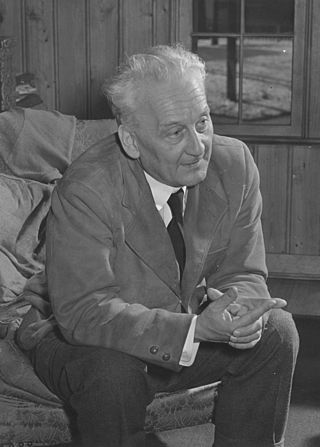Related Research Articles

Craig Cameron Mello is an American biologist and professor of molecular medicine at the University of Massachusetts Medical School in Worcester,Massachusetts. He was awarded the 2006 Nobel Prize for Physiology or Medicine,along with Andrew Z. Fire,for the discovery of RNA interference. This research was conducted at the Carnegie Institution of Washington and published in 1998. Mello has been a Howard Hughes Medical Institute investigator since 2000.

Joan Elaine Argetsinger Steitz is Sterling Professor of Molecular Biophysics and Biochemistry at Yale University and Investigator at the Howard Hughes Medical Institute. She is known for her discoveries involving RNA,including ground-breaking insights into how ribosomes interact with messenger RNA by complementary base pairing and that introns are spliced by small nuclear ribonucleic proteins (snRNPs),which occur in eukaryotes. In September 2018,Steitz won the Lasker-Koshland Award for Special Achievement in Medical Science. The Lasker award is often referred to as the 'American Nobel' because 87 of the former recipients have gone on to win Nobel prizes.
Xiaodong Wang is a Chinese-American biochemist best known for his work with apoptosis,one of the ways through which cells kill themselves.
Xiaowei Zhuang is a Chinese-American biophysicist who is the David B. Arnold Jr. Professor of Science,Professor of Chemistry and Chemical Biology,and Professor of Physics at Harvard University,and an Investigator at the Howard Hughes Medical Institute. She is best known for her work in the development of Stochastic Optical Reconstruction Microscopy (STORM),a super-resolution fluorescence microscopy method,and the discoveries of novel cellular structures using STORM. She received a 2019 Breakthrough Prize in Life Sciences for developing super-resolution imaging techniques that get past the diffraction limits of traditional light microscopes,allowing scientists to visualize small structures within living cells. She was elected a Member of the American Philosophical Society in 2019 and was awarded a Vilcek Foundation Prize in Biomedical Science in 2020.

Aviv Regev is a computational biologist and systems biologist and Executive Vice President and Head of Genentech Research and Early Development in Genentech/Roche. She is a core member at the Broad Institute of MIT and Harvard and professor at the Department of Biology of the Massachusetts Institute of Technology. Regev is a pioneer of single cell genomics and of computational and systems biology of gene regulatory circuits. She founded and leads the Human Cell Atlas project,together with Sarah Teichmann.

V. Narry Kim is a South Korean biochemist and microbiologist,best known for her work on microRNA biogenesis. Her pioneering studies have laid the groundwork for the biology of microRNA and contributed to the improvement of RNA interference technologies.
Zhijian "James" Chen is a Chinese-American biochemist and professor in the department of molecular biology at University of Texas Southwestern Medical Center. He is best known for his discovery of mechanisms by which nucleic acids trigger innate and autoimmune responses from the interior of a cell,work for which he received the 2019 Breakthrough Prize in Life Sciences.
Ronald R. Breaker is an American biochemist who is a Sterling Professor of Molecular,Cellular,and Developmental Biology at Yale University. He is best known for the discovery of riboswitches. His current research is focused on understanding advanced functions of nucleic acids,including the discovery and analysis of riboswitches and ribozymes.

Richard H. Scheller is the former chief science officer and head of therapeutics at 23andMe and the former executive vice president of research and early development at Genentech. He was a professor at Stanford University from 1982 to 2001 before joining Genentech. He has been awarded the Alan T. Waterman Award in 1989,the W. Alden Spencer Award in 1993 and the NAS Award in Molecular Biology in 1997,won the 2010 Kavli Prize in Neuroscience with Thomas C. Südhof and James E. Rothman,and won the 2013 Albert Lasker Award for Basic Medical Research with Thomas Südhof. He was also given the Life Sciences Distinguished Alumni Award from University of Wisconsin–Madison. He is a Fellow of the American Academy of Arts and Sciences and a Member of the National Academy of Sciences.
Mark A. Krasnow is a Professor of Biochemistry at Stanford University School of Medicine. He earned his B.S. in Biology and Chemistry from the University of Illinois in 1978,his Ph.D. in biochemistry in 1983,and his M.D. in 1985 from The University of Chicago under the guidance of Nicholas R. Cozzarelli. He did his postdoctoral work on the Ultrabithorax gene with David Hogness at Stanford University. He has been a professor at Stanford since 1988 and is currently the chair of the program. His research is focused on understanding the molecular,genetic,and cellular mechanisms of tracheal development using drosophila and mice. He has been a Howard Hughes Medical Institute (HHMI) investigator since 1997 and is a Fellow of the American Association for the Advancement of Science and the American Academy of Arts and Sciences. He has been elected as the National Academy of Medicine in 2016,and the National Academy of Sciences in 2019.

The Szent-Györgyi Prize for Progress in Cancer Research,established by National Foundation for Cancer Research (NFCR) and named in honor of Albert Szent-Györgyi,Nobel laureate and co-founder of NFCR,has been awarded annually since 2006 to outstanding researchers whose scientific achievements have expanded the understanding of cancer and whose vision has moved cancer research in new directions. The Szent-Györgyi Prize honors researchers whose discoveries have made possible new approaches to preventing,diagnosing and/or treating cancer. The Prize recipient is honored at a formal dinner and award ceremony and receives a $25,000 cash prize. In addition,the recipient leads the next "Szent-Györgyi Prize Committee" as honorary chairman.

Lynne Elizabeth Maquat is an American biochemist and molecular biologist whose research focuses on the cellular mechanisms of human disease. She is an elected member of the American Academy of Arts and Sciences,the National Academy of Sciences and the National Academy of Medicine. She currently holds the J. Lowell Orbison Endowed Chair and is a professor of biochemistry and biophysics,pediatrics and of oncology at the University of Rochester Medical Center. Professor Maquat is also Founding Director of the Center for RNA Biology and Founding Chair of Graduate Women in Science at the University of Rochester.
Stuart Holland Orkin is an American physician,stem cell biologist and researcher in pediatric hematology-oncology. He is the David G. Nathan Distinguished Professor of Pediatrics at Harvard Medical School. Orkin's research has focused on the genetic basis of blood disorders. He is a member of the National Academy of Sciences and the Institute of Medicine,and an Investigator of the Howard Hughes Medical Institute.
Michael Green was an American molecular biologist and cell biologist at the University of Massachusetts Medical School,where he was the chair of the Department of Molecular,Cell and Cancer Biology,director of the UMass Cancer Center,and a Howard Hughes Medical Institute investigator. Green was a member of the National Academy of Sciences and the National Academy of Medicine.
Jeannie T. Lee is a Professor of Genetics at Harvard Medical School and the Massachusetts General Hospital,and a Howard Hughes Medical Institute Investigator. She is known for her work on X-chromosome inactivation and for discovering the functions of a new class of epigenetic regulators known as long noncoding RNAs (lncRNAs),including Xist and Tsix.

Adrian Robert Krainer is a Uruguayan-American biochemist and molecular geneticist known for his research into RNA gene-splicing. He helped create a drug for patients with spinal muscular atrophy. Krainer holds the St. Giles Foundation Professorship at Cold Spring Harbor Laboratory in Laurel Hollow,New York.
Anna Marie Pyle is an American academic who is a Sterling Professor of Molecular,Cellular &Developmental Biology and a Professor of Chemistry at Yale University. and an Investigator for Howard Hughes Medical Institute. Pyle is the president of the RNA Society,the vice-chair of the Science and Technology Steering Committee at Brookhaven National Laboratory,and previously she served as chair of the Macromolecular Structure and Function A Study Section at the National Institutes of Health.
Paul A. Khavari is the Carl J. Herzog Professor at the Stanford University School of Medicine and the Founding Co-Director of the Stanford Program in Epithelial Biology. He is an elected member of the National Academy of Medicine.
J. Paul Taylor is an American physician scientist and research hospital director known for his contributions to the fields of neurogenetics,RNA biology,and neurological disease,including the role of biomolecular condensation in neurological diseases such as ALS.
References
- ↑ "Howard Y. Chang, MD PhD". Stanford University Neurosciences Institute.
- ↑ "Howard Y. Chang, MD, PhD". Howard Hughes Medical Institute. Retrieved January 10, 2020.
- ↑ "Curriculum Vitae: Howard Y. Chang". Stanford University. Archived from the original on December 5, 2005. Retrieved July 27, 2018.
- ↑ "中研院院士解開「自體免疫疾病」之謎!張昭雄之子張元豪:罪魁禍首是RNA分子「Xist」". The Storm Media (in Chinese (Taiwan)). 4 February 2024. Retrieved 12 October 2024.
- ↑ "Howard Y. Chang, MD PhD". Stanford University. Retrieved July 27, 2018.
- ↑ "2018 NAS Award in Molecular Biology". National Academy of Sciences. Retrieved January 10, 2020.
- ↑ King Faisal Prize 2024
- ↑ Albany Medical Center Prize 2024
- ↑ "Howard Y. Chang". American Academy of Arts & Sciences. Retrieved 2021-01-09.